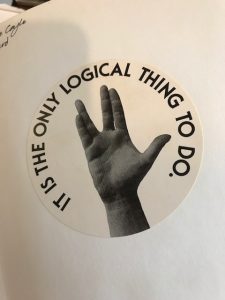Yesterday I took part in an IdeaFactory session at the annual OECD Forum titled: ‘A Survivor’s Guide to a Post-Truth World’. The jury is out on whether experts (including economists) are going to be survivors, even after the session I think. As ever, though, it was fascinating, the discussion in our breakout group, really making me think above all about my personal actions: do I make enough of an effort to listen to people whose views I disagree with? or enough of an effort to overcome confirmation bias when I read things online? Another message I took away was to think about the relationship between online debate and face-to-face interaction, and the role of physical social and family networks. For example, if there are subjects on which we disagree with people close to us IRL that we can’t discuss, how on earth is that debate supposed to happen in any public forum?
Anyway, plenty of interesting books were mentioned. Matthew D’Ancona, one of three recent books called Post Truth (the others are by Evan Davis and by James Ball) was a speaker. (His point was that there’s nothing new about the production of lies but the consumption possibilities and behaviours have changed.) So was Brian Cathcart, co-author of Everybody’s Hacked Off (and once a colleague of mine), and philosopher Vincent Henricks, co-author of Infostorms. Other titles mentioned – ones I’d not heard of – were Joi Ito’s Whiplash and Joshua Cooper Ramo’s The Seventh Sense. Oh, and Durkheim came up in conversation. All round, plenty to think about.
[amazon_link asins=’1785036874,1408703319,1785902148′ template=’ProductAd’ store=’enlighteconom-21′ marketplace=’UK’ link_id=’133b9f50-4b79-11e7-990b-21620247f72d’]
[amazon_link asins=’331932764X’ template=’ProductAd’ store=’enlighteconom-21′ marketplace=’UK’ link_id=’338e023b-4b79-11e7-a721-b985d34f3aac’]
[amazon_link asins=’1455598399′ template=’ProductAd’ store=’enlighteconom-21′ marketplace=’UK’ link_id=’3dc0f0d8-4b79-11e7-af42-73357602563a’][amazon_link asins=’0316395056′ template=’ProductAd’ store=’enlighteconom-21′ marketplace=’UK’ link_id=’4bc7ca04-4b79-11e7-b71c-87334648333b’]
[amazon_link asins=’024196556X’ template=’ProductAd’ store=’enlighteconom-21′ marketplace=’UK’ link_id=’6f7f50e2-4b79-11e7-88a9-edb6bb8d4cda’][amazon_link asins=’0521097126′ template=’ProductAd’ store=’enlighteconom-21′ marketplace=’UK’ link_id=’d78a7234-4b79-11e7-8cd5-3dd6b148e151′]

